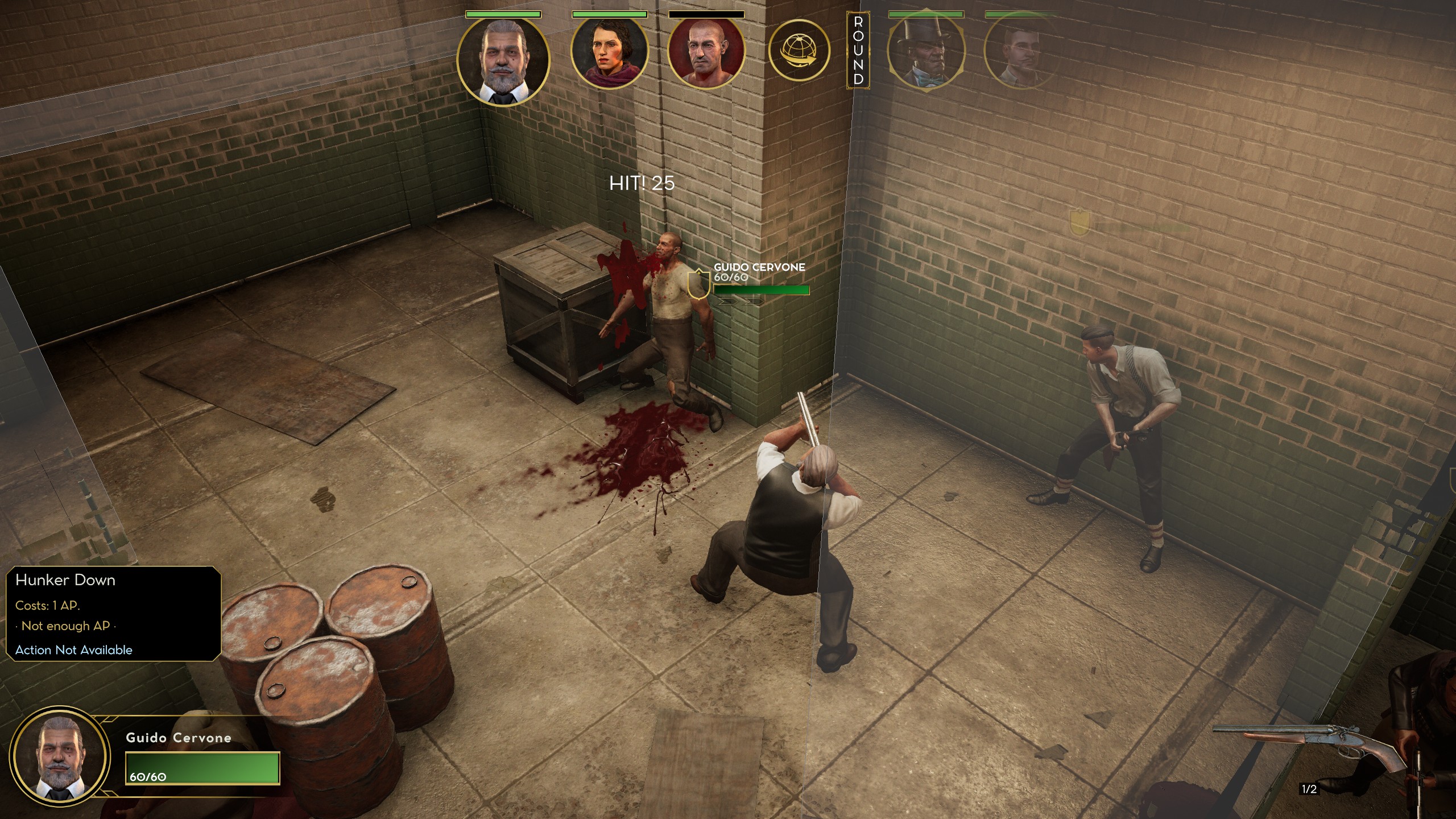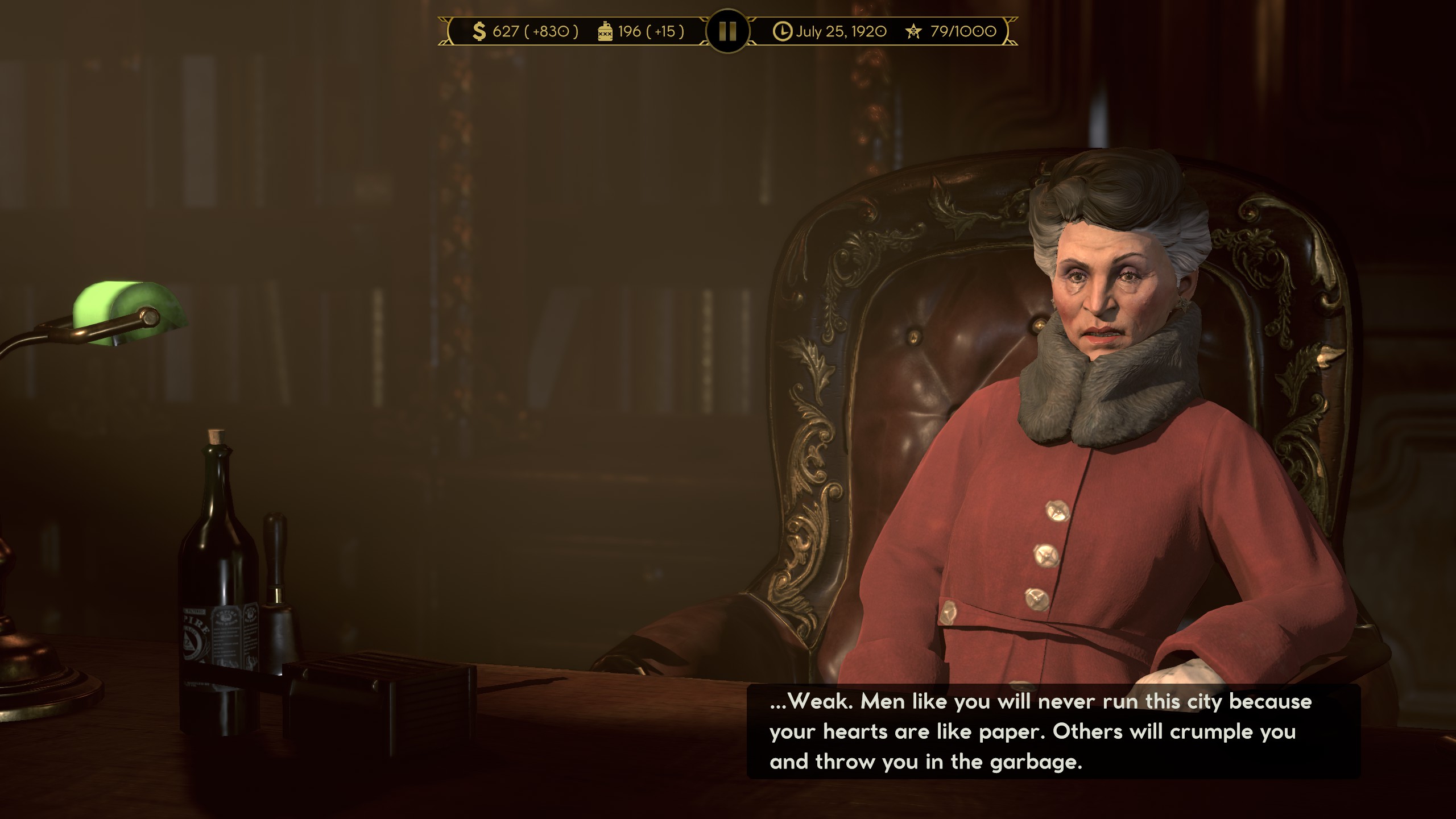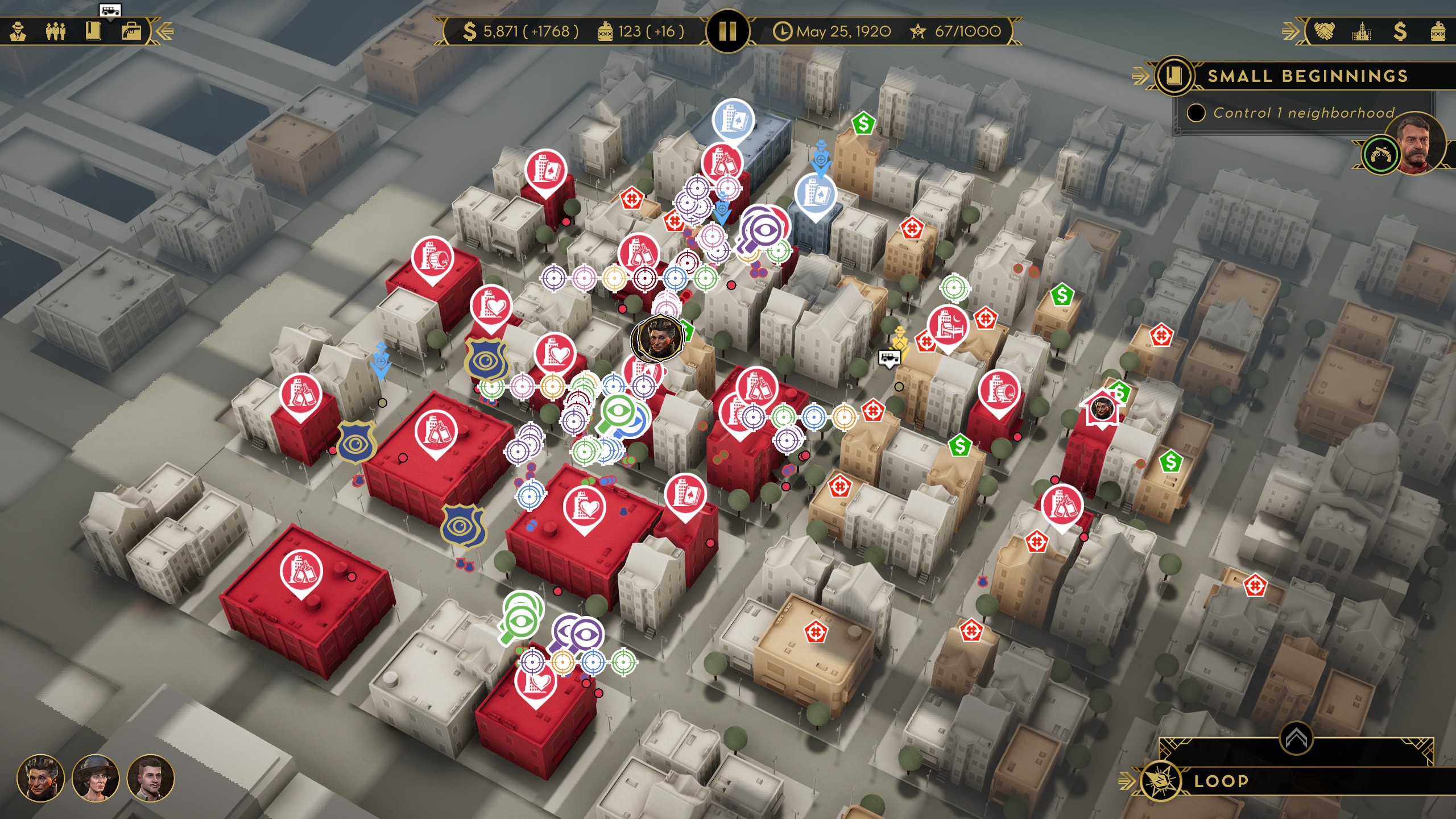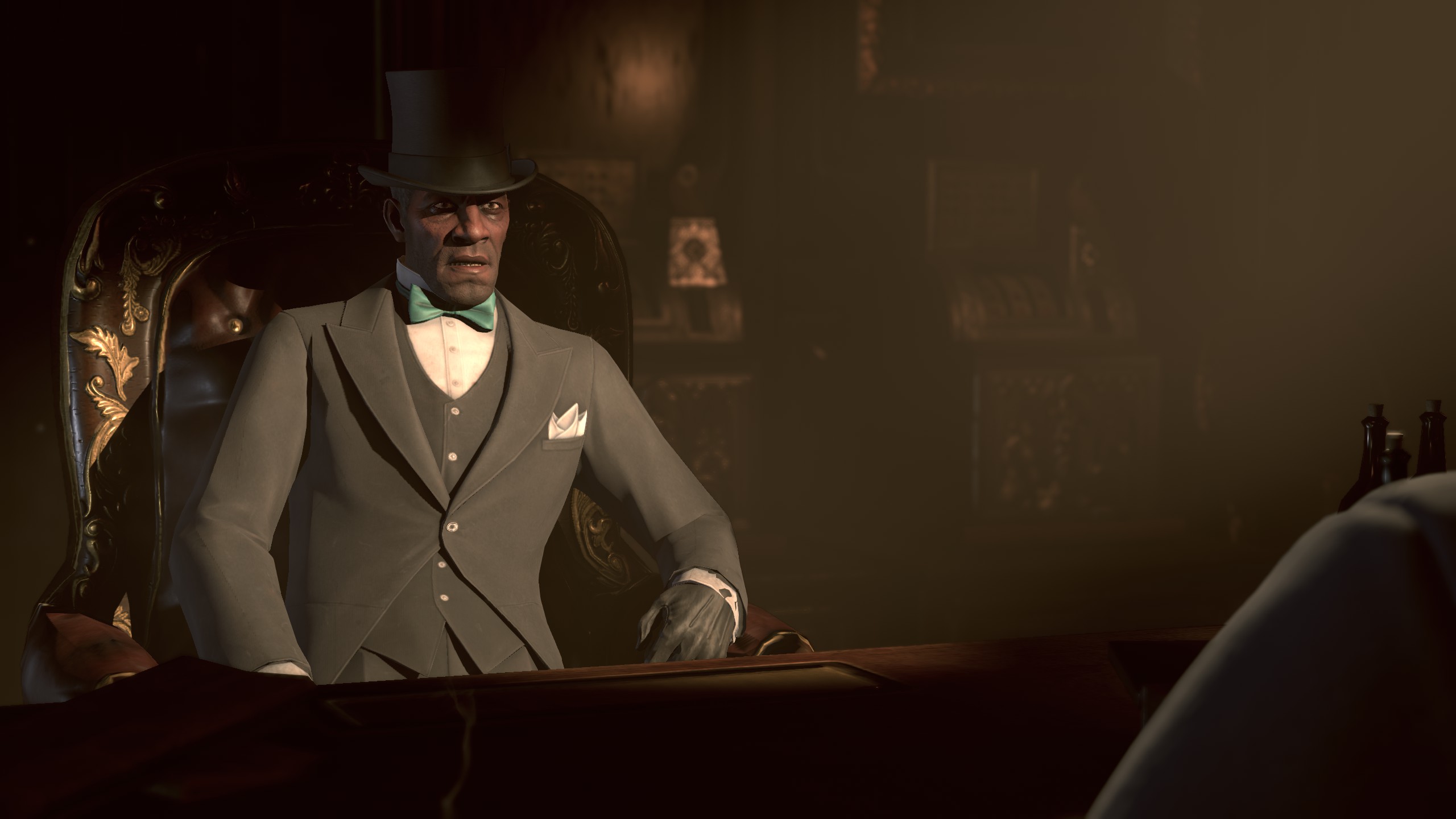What is it? Character-driven mob management in 1920s Chicago.
Expect to pay £35/$40
Developer Romero Games
Publisher Paradox Interactive
Reviewed on GTX 1080 Ti, Intel i7-8086K, 16GB RAM
Multiplayer? No
Release date December 1
Link Official site
I’ve got Feds breathing down my neck, a friend I need to betray, employees getting into love triangles and rivals making big plays—no wonder mob bosses end up a bit high strung. There are times when Empire of Sin’s missions and emergent chaos collide to create a cyclone of compelling mobster drama full of intrigue, booze and bullets. Unfortunately, it mostly just gets in its own way, with systems tripping over each other or bugs dragging them down.
My attempts to become the biggest mob boss in all of 1920’s Chicago haven’t been foiled by the cops or my rivals, but by corrupt saves, broken missions and employees that simply vanish. Two campaigns have ended up in the bin because of two entirely separate game-breaking issues. I’ve had smoother experiences with fresh early access games, and frankly I feel like I’ve just been a QA tester for a week. Even with access to the day one patch, I’ve encountered some significant problems, and they go a lot deeper than bugs.
Empire of Sin makes a good first impression, though. It’s clearly born out of a genuine fascination with the prohibition era, and as a management game it tries to capture the breadth of the illegal businesses and shady deals that kept these underground empires going—but it’s even more interested in the people that join and run them. It’s as much an RPG, and each boss has their own distinct, branching storyline that lets you shape the kind of crook you want them to become.

Daniel McKee Jackson—one of several characters inspired by historical mobsters—is a community-minded boss who runs a funeral business on top of all his criminal enterprises. He’s also the only one brave enough to wear a top hat. Playing through his personal missions, l was able to decide if he’d be a ruthless businessman and aspiring politician, willing to do anything for a seat at the table, or man who breaks the law to make Chicago a better place. I opted for something in the middle, and my decisions during the big story moments then informed how I’d handle side missions and meetings with other bosses. It didn’t take long until I knew exactly how I’d deal with a crisis even before the options were laid out.
The choices are usually binary, typically falling into the villainous or benevolent categories, so they’re not that nuanced, but sometimes the roleplaying options do offer a bit more flexibility. You might, for instance, be inclined to pick the lesser of two evils at the cost of a big payout, but succeeding a persuasion or intimidation check could still earn you comparable or even greater rewards. It’s familiar territory for RPGs, but in a game about forging a business empire and shooting up speakeasies, where you’d expect individual characters to get less time in the limelight, it really stands out.
Underlings generate plenty of drama and conflict, too. They’ve all got friendships, rivalries and vices, as well as their own side missions, all of which create new opportunities and obstacles. I couldn’t get the boyfriend of one of my hired killers to join the outfit because he hated my buddy, Hugh, a burly veteran soldier who never takes off his uniform. Hugh then ended up falling for this guy’s gal, turning him into an avenging angel of death whenever she got injured in battle. Every boss and gangster starts with traits inspired by their background, and then more get piled on as they fall in love, get hooked on the hooch or brutally execute a bunch of people. These can change how they fight, and how suited they are to leadership roles. Even when they just bump some stats, their impact is felt. And this is on top of the myriad combat abilities that you can manually select, letting your goons throw axes, heal mates and shower rooms in lead.

Sit-downs are where Empire of Sin’s criminal cast really gets to shine. While there’s still that generic strategy game diplomacy menu that we can’t seem to shake, you can also meet rival bosses to shoot the shit and make deals. They’re hammy and immensely fun conversations, taking advantage of each gangster’s personality and history to create memorable verbal sparring matches. Some of the voice performances are great, others are a bit awkward, but they’re always enthusiastic and, importantly, offer clues about your rival’s temperament. The illusion is shattered, unfortunately, when they offer completely random deals with terms that contradict each other, or when you realise that every deal is just a straightforward buff that costs you nothing. They’re essentially just lucky dips.
The soap opera diversions are a lot more entertaining than sitting at a desk, staring at messy Art Deco menus and stark maps. The day-to-day management of even the most crooked of casinos is not, unfortunately, as exciting as you’d expect, and while there are a few different ways to ensure your businesses flourish, like matching the booze to the affluence of the area, it mostly amounts to just pouring excess cash into upgrades. Every now and then I found myself needing to spruce a brothel up for a celeb or sacrifice one of my properties for a bigger, riskier payout, with the game remembering that the seductive appeal of a life of crime is more complicated than watching a bank balance increase, but there was nothing making me feel invested in any individual business. Pretty quickly, they just became names in a list, which I’d occasionally click on to upgrade their security or ambience.
If you’re inclined, you’ll discover a lot of depth, but it’s hard work digging into it thanks to a general lack of clarity and consistency when it comes to the interface. The payoff just isn’t worth it, either. You don’t really need to put in much effort to fill your swimming pool with cash. You can influence the character and affluence of an area through your businesses and criminal shenanigans, for instance, but I’ve not found it necessary to actively try to manipulate them. Constant, unrelenting expansion seems to always win the day, and once I’d locked down one neighbourhood I never had to think about cash again. You’re pushed to play aggressively, but doing so effectively neuters the entire management layer. Instead of supporting each other, it instead feels like the disparate systems are fighting for attention and pushing others out of the way.
Combat is in a similar place. Everyone in the colourful rogue’s gallery has a class-based skill tree, a growing list of dynamic traits and loads of slots for weapons and gear, which you can buy, loot and earn from missions. You can create a little criminal army, bung them into squads and tailor each of them for specific situations. It’s lightyears ahead of what you’d expect from a management game and suggests some crunchy, elaborate battles. They never materialise.
Fights can break out inside businesses or on the street, but the most interesting thing about these impromptu battle arenas is that there’s cover, or that maybe a nearby cop or random thug will be drawn into the scrap. It doesn’t get much more surprising than that, and it’s otherwise just an endless parade of plain bars, warehouses and depressing brothels, where you’ll mostly fight faceless goons that go down in a couple of shots. Some abilities are so powerful that you can end a battle in one attack, and you’ll quickly get unique weapons that eradicate any remaining challenge. The balance is just wildly off, leaving little reason to think tactically. In the late game, it’s hard to lose a fight even if you’re trying. Because of all the counters and reaction shots that you can get from abilities and traits, it’s possible to win a fight without taking a single action. I’d prefer an auto-resolve button.
When you declare war on another boss, they immediately send their goons after your businesses, most of which will be protected exclusively by your unnamed guards. It’s cannon fodder versus cannon fodder, where everyone is weak and near-sighted. Even the quick ones are a drag. The stakes couldn’t be lower, either, because you can end a war and steal every business simply by sauntering into a safehouse and killing the boss in a slightly tougher but still pretty effortless battle. That’s the most effective way to win—ignoring your businesses, the missions and all the drama, and just rushing straight into a series of quick, forgettable fights.

This might be good news for any prospective Empire of Sin speedrunners out there, but being able to easily skip the majority of the game is a peculiar feature. If the combat was engaging or I actually wanted to spend more time trying to untangle the menus—I do not—then maybe the easy route wouldn’t be as much of a temptation, but it’s also the best way I’ve found to actually finish a campaign without running afoul of progress-halting bugs. It feels like a shortcut or an exploit, but really it’s just the most efficient way to reach the game’s sole victory condition.
Empire of Sin is an ambitious management game that never manages to tie together its big ideas. There’s definitely a version of it in there somewhere that’s good, and the allure of all those dense and malleable systems is strong, but they all come with massive caveats that dwarf what it does well. It’s just a bit of a mess. It’s frustrating. The potential is obvious, but it hasn’t been realised.
